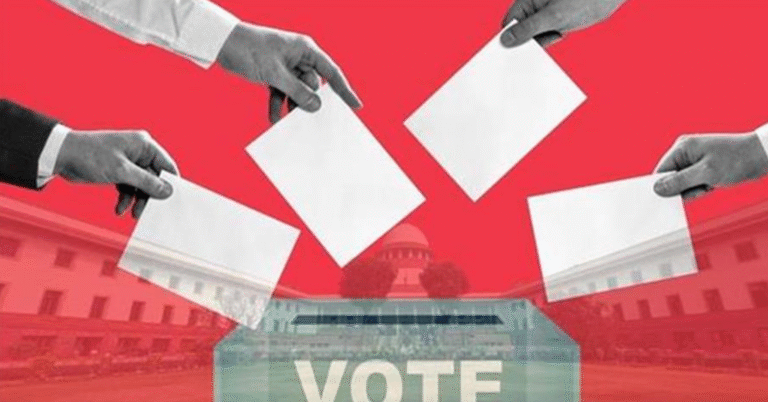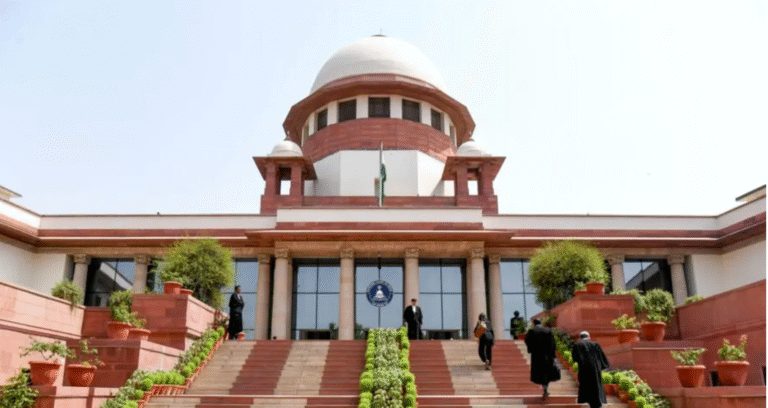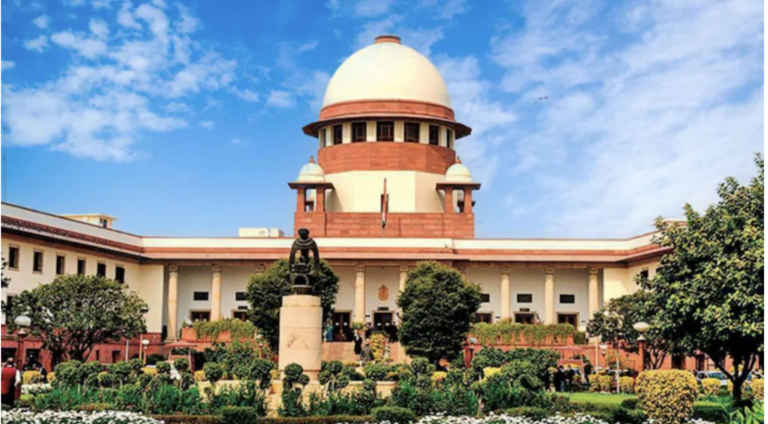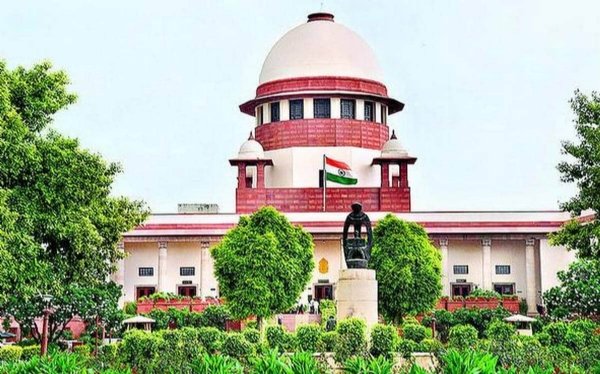Historic Hearing before Constitution Bench on September 4 in Case against Justice Revathi Mohite-Dere.
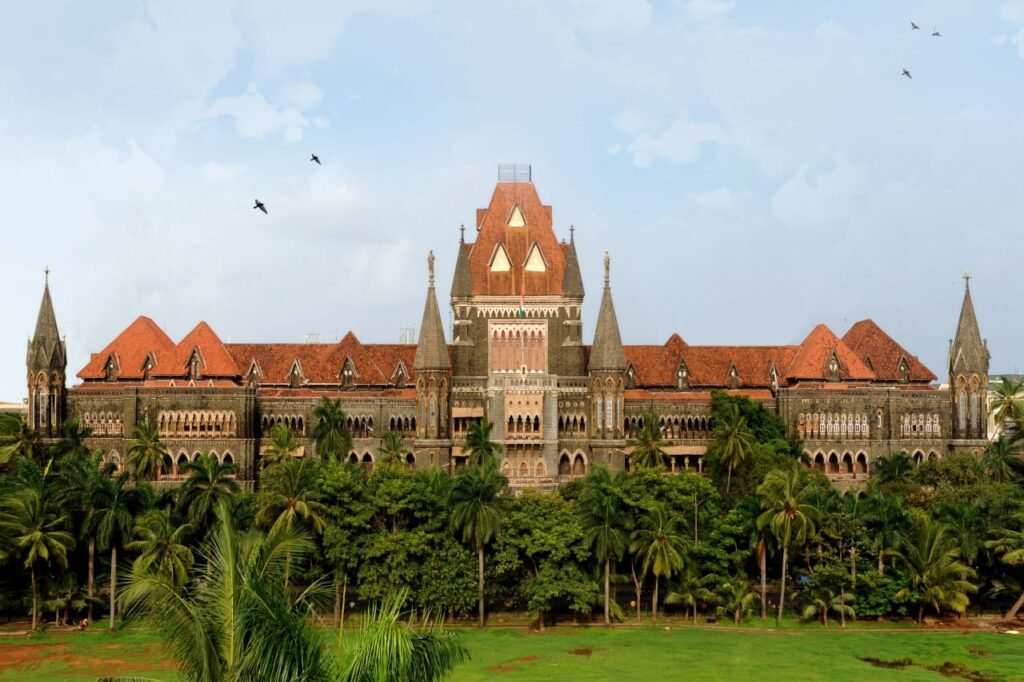
A five-judge Constitution Bench of the Bombay Court will hear the matter concerning Justice Revathi Mohite-Dere on September 4. The proceedings will be broadcast live, with an application for issuance of an arrest warrant against the Judge also on the agenda.
1. Affidavit Alleges Corruption and Misconduct :- The Respondent Adv. Nilesh Ojha, has placed on record a detailed affidavit containing what he describes as evidence of corruption by Justice Mohite-Dere. He has sought an arrest warrant and initiation of criminal proceedings against her.
2. Justice Mohite-Dere’s complaint dated April 4, 2025, Proved to be False from records of CBI and Police reports. :- It was filed against Adv. Ojha and against sections of the media, has, according to the affidavit, been proved false. The evidence cited includes confidential documents, police reports, orders of the Sessions Court, CBI Court orders, and records from a contempt petition pending before the Supreme Court.
3. Allegation of Ploy to Suppress Truth :- On the basis of this material, an application has been moved contending that Justice Mohite-Dere’s complaint was nothing more than a ploy to deflect attention from allegations of misconduct and corruption. It has therefore been prayed that she face not only criminal prosecution but also contempt proceedings.
4. Calls for Removal and Impeachment :- In light of the allegations, demands are mounting that Justice Mohite-Dere be removed from judicial office, with impeachment proceedings initiated against her, similar to action taken earlier against Justice Yashwant Varma.
5. Statement of Responsibility by Adv. Ojha :- Advocate Ojha has reiterated his stand, stating:
“If my affidavit and the evidence I have presented is found to be false, action should also be taken against me.”
Mumbai:
6. A five-judge Constitution Bench of the Supreme Court will, on September 4, take up the matter concerning Justice Revathi Mohite-Dere, in what is being described as a historic and unprecedented hearing. The proceedings, which will be broadcast live, are expected to include consideration of an application seeking an arrest warrant against the sitting High Court Judge.
7. Advocate Nilesh Ojha, appearing as Respondent, has filed a detailed affidavit styled as a Reply-cum-Statement of Defence (I.A. No. 3092 of 2025), enclosing what he describes as serious and confidential evidence of corruption against Justice Mohite-Dere. He has prayed that the Court issue an arrest warrant and direct her prosecution under criminal law.
8. Ojha has drawn attention to the paper book circulated by the High Court Registry, which, according to him, establishes that the suo motu contempt proceedings have been triggered solely on the basis of Justice Mohite-Dere’s complaint dated April 4, 2025. Relying on binding Supreme Court precedents, he has argued that once a Judge voluntarily lodges such a complaint, she assumes the role of a de facto complainant, forfeits any judicial privilege, and must be treated like any other citizen—liable to prosecution without the requirement of prior sanction.
9. Evidence Highlighted in the Affidavit :- The affidavit filed by Ojha highlights three sets of allegations, described as instances of judicial dishonesty, forgery of court records, and conflict of interest:
(i) Forgery in the Chanda Kochhar Bail Matter:
It is alleged that while granting bail to Smt. Chanda Kochhar in Criminal Writ Petition (St.) No. 22494 of 2022, Justice Mohite-Dere deliberately omitted to record Section 409 IPC, an offence punishable with life imprisonment, and instead falsely noted in her order dated 09.01.2023 that the maximum punishment was only seven years. This, according to Ojha, was done to bring the case within the protective ratio of Arnesh Kumar v. State of Bihar, (2014) 8 SCC 273. Furthermore, the Judge is accused of ignoring the order of the Special CBI Judge and thereby acting in violation of binding guidelines laid down by the Supreme Court in Ram Pratap Yadav v. Mitra Sen Yadav, (2003) 1 SCC 15.
(ii) Forgery in the Dilip Mohite Bail Matter:
Ojha’s affidavit further alleges that in granting bail to NCP MLA Dilip Mohite in ABA No. 1621 of 2019, by orders dated 26.07.2019 and 21.08.2019, the learned Judge deliberately concealed material facts. Specifically, she is alleged to have suppressed that Section 307 IPC (attempt to murder) had been invoked against the accused based on evidence showing a conspiracy to kill a police officer and to attack a police station. An earlier order dated 19.07.2019, which explicitly recorded these findings, was allegedly kept out of consideration to facilitate bail. This, according to Ojha, constitutes judicial dishonesty and fraud on power, as recognised in Muzaffar Husain v. State of U.P., 2022 SCC OnLine SC 567, and Kamisetty Pedda Venkata Subbamma v. Chinna Kummagandla Venkataiah, 2004 SCC OnLine AP 1009.
(iii) The affidavit also underscores a serious conflict of interest arising from the fact that Smt. Vandana Chavan, former Member of Parliament and prominent leader of the NCP (Sharad Pawar faction), is the real sister of Justice Revathi Mohite-Dere. It is alleged that the learned Judge has, on several occasions, extended unwarranted reliefs to individuals associated with that political faction, while simultaneously adopting a discriminatory and hostile approach towards litigants perceived to be opposed to the party’s ideology—including members and policies of the BJP-led government. According to Ojha, this family connection gravely compromises the standard of judicial impartiality expected of a High Court Judge and has the effect of vitiating orders passed in politically sensitive cases, thereby undermining public confidence in the fairness and independence of the judiciary.
10. Complaint of April 4, 2025 Proved False :- The affidavit filed by Advocate Nilesh Ojha asserts that the complaint dated April 4, 2025, made by Justice Revathi Mohite-Dere, stands ex facie false and baseless when tested against police reports, court records, and other documentary material. According to Ojha, the complaint was lodged only as a shield to deflect attention from serious allegations of corruption and misconduct.
10.1. The affidavit further states that the falsity of the complaint has been conclusively demonstrated through undisputed records of the police, Sessions Court, CBI Court, and documents already placed before the Supreme Court. Ojha has warned that when a senior Judge herself relies on a false and frivolous complaint, it does not merely tarnish her own credibility but also inflicts grave damage on public faith in the judiciary as an institution.
10.2. Accordingly, the application prays not only for the issuance of an arrest warrant and criminal prosecution, but also for initiation of contempt of court proceedings against Justice Mohite-Dere. Experts believe that if the Constitution Bench formally acknowledges the falsity of the complaint, it would constitute a watershed moment in Indian judicial history, inevitably leading to her prosecution and removal from office.
11. Suspicious Silence :- Despite the gravity of the allegations and the production of documentary evidence, Justice Mohite-Dere has so far chosen to remain silent, offering neither explanation nor defence. This silence has been described in legal circles as suspicious, fuelling concern that the charges may indeed carry substance.
Consequently, demands are intensifying that she be removed from judicial office through impeachment, and that, pending inquiry, she be posted outside the State of Maharashtra to prevent the possibility of undue influence over the ongoing investigation. Several senior figures in the legal fraternity have already expressed support for this demand.
12. The Road Ahead:– Legal experts emphasize that the upcoming September 4 hearing will test three fundamental pillars of the justice system: transparency, public trust, and accountability in combating corruption. The Constitution Bench will not only rule on the veracity of Justice Mohite-Dere’s complaint, but is also expected to set a precedent for judicial accountability in the future.


